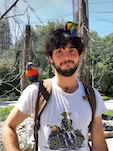
DEJEUX Léo
Doctorant : BAH
Université Lyon 1
CNRS, UMR 5023 - LEHNA,
Laboratoire d'Ecologie des Hydrosystèmes Naturels et Anthropisés
6, rue Raphaël Dubois - Bât. Forel
F-69622 Villeurbanne Cedex FRANCE
-
Cette adresse e-mail est protégée contre les robots spammeurs. Vous devez activer le JavaScript pour la visualiser.


Mes travaux de thèse s'inscrivent à l'interface entre écologie et biologie évolutive et s'intéressent à la plasticité phénotypique, solution évolutive alternative adoptée par les organismes confrontés à des changements environnementaux rapides (naturels ou induits par l'activité humaine). Il s'agit de la capacité d'un génotype à produire des phénotypes alternatifs en fonction des conditions environnementales, de telle sorte que la valeur sélective moyenne augmente.
Dans ce contexte, la plasticité transgénérationnelle est une extension de la plasticité au travers des générations et se définit comme l'effet de l'environnement des ancêtres sur le phénotype des descendants. Le phénotype induit par les conditions environnementales rencontrées par les parents peut être observé dès la première génération de descendants et peut perdurer.
Ce projet de thèse s'articule autour de trois axes ayant pour objectifs de déterminer (i) la dynamique temporelle de la plasticité transgénérationnelle sur plusieurs générations, (ii) le potentiel évolutif de ce processuset (iii) d'explorer les mécanismes moléculaires sous-jacents qui permettent la transmission d'informations environnementales aux générations futures. Ce projet sera mené dans le contexte des interactions proies-prédateurs, sur les défenses induites par le gastéropode d'eau douce Physa acuta.
My thesis work stands at the interface between ecology and evolutionary biology and focuses on phenotypic plasticity, an alternative evolutionary solution adopted by organisms faced with rapid environmental changes (natural or induced by human activity). It is the ability of a genotype to produce alternative phenotypes in response to environmental conditions, so that the average fitness increases.In this context, transgenerational plasticity is an extension of plasticity across generations and is defined as the effect of the environment of the ancestors on the phenotype of the descendants. The phenotype induced by the environmental conditions encountered by the parents can be observed as early as the first generation of offspring and can persist.This thesis project is structured in three axes with the objectives of investigating (i) the temporal dynamics of transgenerational plasticity over several generations, (ii) the evolutionary potential of this process and (iii) exploring the underlying molecular mechanisms that allows the transmission of environmental information to future generations. This project will be conducted in the context of prey-predator interactions, on the defences induced by the freshwater gastropod Physa acuta.- 2025 Dejeux, L., Saclier, N., Tariel-Adam, J., Hoareau, M., Lefébure, T., Konecny, L., Plénet, S., Luquet, E., 2025 - Transcriptomic basis of within- and trans-generational predator-induced plasticity in the freshwater snail Physa acuta. Heredity, 134 (7), pp.439-449. ⟨10.1038/s41437-025-00775-9⟩.































